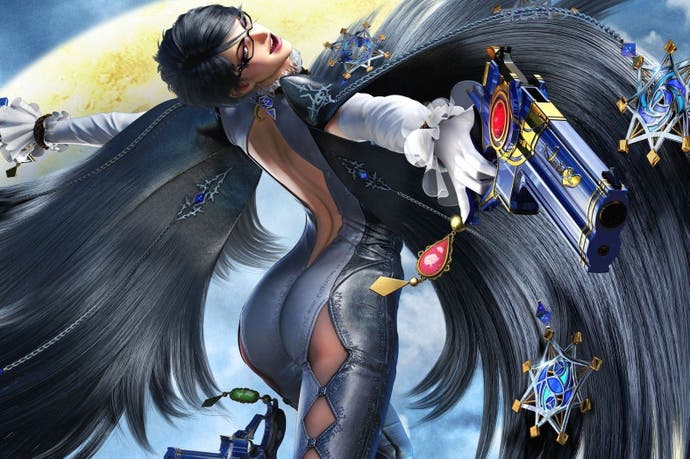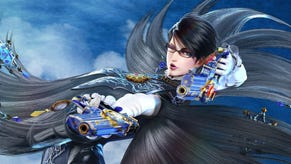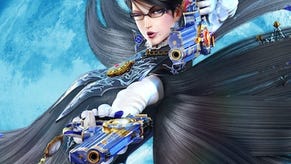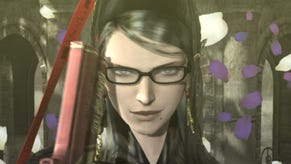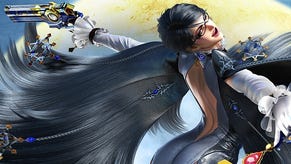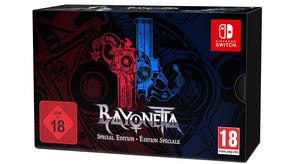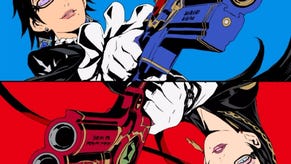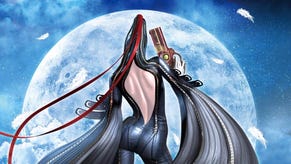Bayonetta 2 review
Second climax.
Bayonetta 2's main theme is as good as it gets, and as good a place as any to start when it comes to talking about Platinum Games' Wii U exclusive. A sugar-rush of melodramatic keyboard stabs and a high-impact, snap-happy backbeat, it's chaos held together by irresistibly sassy vocals and a killer of a chorus. "You won't know what hit you when I spin around with you in my dust - Bang bang! Down down!" It gets me every time.
Unruly energy held together with some serious style; that's what the original Bayonetta was all about, and it's no different for a sequel in which much is left intact. Bayonetta herself has a new haircut - yes, it matters, and yes I'm a fan of the shorter, ordered bob that sees the balance of Mari Shimazaki's character design move a small step away from S&M madam and towards something more bookish - and an expanded move-set that's more gymnastic and more elastic than in her previous game. For all its bombast, Bayonetta 2 takes only baby steps, and is cast firmly in the mould of the 2009 original. It's something which works both for better and for worse.
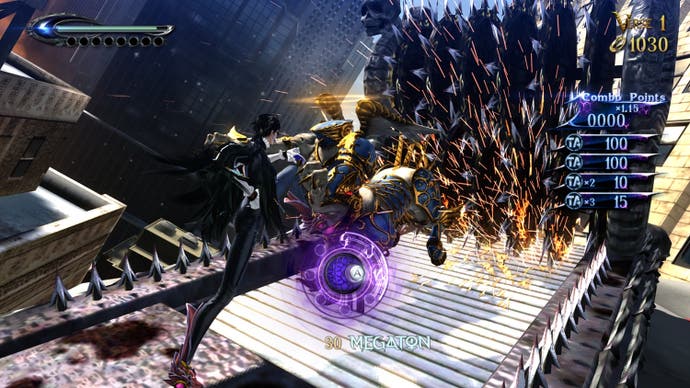
After The Wonderful 101, this is the second of Nintendo's collaborations with Platinum Games, though it's unlike any other Nintendo exclusive. From the second Bayonetta 2 was announced for the Wii U, there's always been that slight tension between the spiky, violent and often absurd action of Platinum Games' most cherished child and those softer edges perceived of Nintendo's own. It turns out Bayonetta fits amongst Nintendo's line-up well enough, though, and she's got more in common with her new counterparts than you might have first thought. There's something of the Kyoto philosophy in the exquisite engineering whirring away beneath the encounters; something of Tokyo EAD in the imagination poured into where each new set-piece takes you.
Not that Bayonetta 2 has made many concessions to the hardware. There's off-screen play and touch controls, the former working perfectly well while the latter is a functional, optional and largely unwelcome overlay to what is, even in its most frenetic moments, an exercise in precision. Unlockable Nintendo-themed costumes invite the incongruous sight of a leggy six-foot Link stomping an angel into a torture rack before cracking its arse repeatedly with a sharp green boot, while a Samus suit, complete with morph ball and spin jump, deliciously crashes two of gaming's great female icons together.
Elsewhere there are what may well be remnants of Bayonetta 2's former life, before it was salvaged by a Nintendo shopping for curios for its console. Achievements exist, despite the Wii U shunning them, in the form of Bewitchments, and there's no doubting that the best way to connect with the combat is through the 360-like Pro Controller. Fluid, ferocious and with a surreal edge, Bayonetta 2 is another neat evolution of a formula that stretches back through Metal Gear Rising Revengeance, the original Bayonetta and Hideki Kamiya's own Devil May Cry.
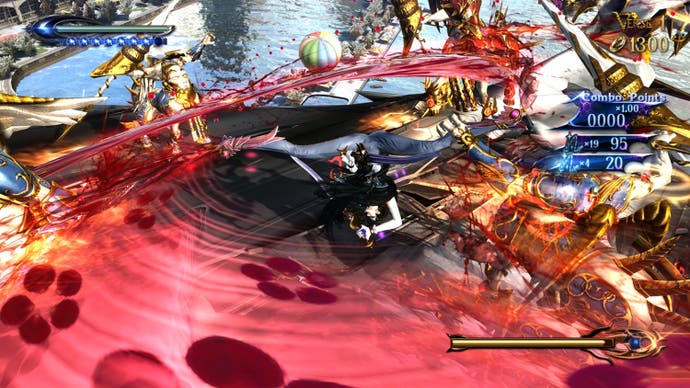
Kamiya may have been absent from the development team owing to commitments elsewhere - it seems he's fated never to work on a sequel to his own creations - but his fingerprints are all over Bayonetta 2. He wrote the scenario and much of Bayonetta's dialogue, but the story's as duff as everything that went before, made that little more unpalatable by the introduction of Loki, a cherubic companion with a loose English accent drawn from the depths of hell. It matters not a jot: Bayonetta's as classy as ever and knows when to wheel out a perfectly placed expletive as devastating as any wicked weave-tipped combo (much like her creator), while the presence of core members of the original game's development team make this sequel a seamless transition.
So what's different? There's the haircut, of course, and a new set of animations that opens up Bayonetta's attack patterns, but what hits you at first is the sheer amount of colour that's been squeezed into the sequel. Bayonetta 2 takes you from heaven to hell with a few familiar locations thrown in between and the lysergic palette is enough to make angels weep, leaving the original looking dreary and muted by comparison. There might be more technically impressive games out this year, but when it comes to pure, eye-searing spectacle, there's nothing that can come close to what Platinum's achieved with the Wii U for Bayonetta 2.
Some new crinkles appear in the combat too, though some aren't exactly welcome. New underwater sections strip away some of the precision that's core to Bayonetta's charm and end up as mildly irritating interludes that are thankfully brief in number. More successful is the Umbran Climax that unleashes absurdly powerful attacks for a limited window once a magic meter has been topped. It doesn't tip the balance so much as extend the repertoire, a new crescendo perched atop those that already existed in Bayonetta's never-ending rush of kinetic combos.
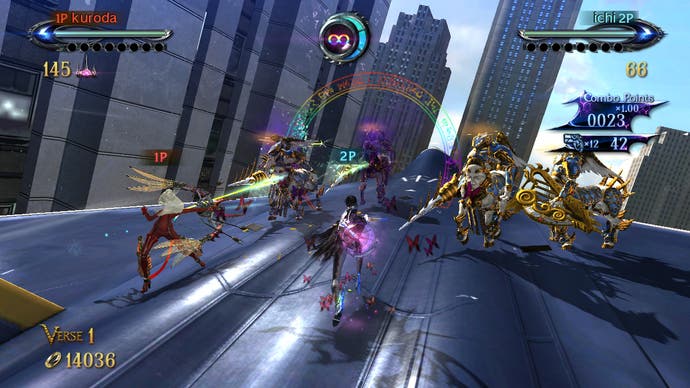
The ability to share that thrill in Tag Climax, a new online co-op mode that sees two players duke it out against waves of enemies in pursuit of the highest score, is perhaps the most profound addition for Bayonetta 2, and it's certainly a welcome one. It's where the combat comes into focus; where you begin to understand the importance of taunting opponents before ripping into them for multipliers, and the importance of mixing up combos to keep that score ticking ever higher. It's where, ultimately, Bayonetta 2's long tail is, a grind pit where you can gamble in-game currency on higher-difficulty enemies and work towards unlocking the full move-set and full wardrobe.
All of which is window dressing to what makes Bayonetta 2 great - a core that will be familiar to anyone who's played through the original. Bayonetta 2 does retain the ability to surprise, even if some of those surprises are second-hand - the questionable Space Harrier tribute that bogged down the end of the original Bayonetta is replaced by a much more convincing After Burner pastiche, the racing sections boiled down to slicker, more serviceable chase scenes.
The rhythm of combat remains the same, though it's hard to complain when it's riffing off such a heady beat, where chimed enemy attacks are lithely dodged into slo-mo pugilism, where impossible combos culminate with a 20-foot boot weaved from hair crashing from the heavens and where spinning amidst the avalanche of colour and cartoon violence is Bayonetta herself, stopping only briefly to wink at a player exhausted by the unrelenting joy of it all. Bayonetta 2's biggest disappointment may be that it's an iterative sequel, but it's not such a problem when it's iterating on genius.
